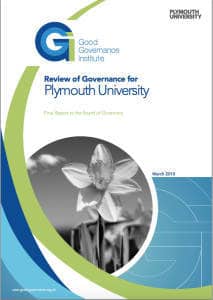A very public review of governance
Governance remains a big, but often largely overlooked, issue in UK higher education. However, the governance challenges at one institution, Plymouth University, attracted considerable coverage in the higher education press over the past year. One of the steps taken was therefore, perhaps unsurprisingly, to undertake a governance review. What is perhaps rather unusual about this review is that the University has decided to publish the report which is available on University’s website.
The Governance Review was undertaken by the Good Governance Institute in November 2014 with the primary purpose of the review being:
To assess the effectiveness of the University’s governance processes, systems, culture and behaviours and recommend improvements with regard to governance best practice, nationally and internationally in higher education (HE) and other sectors.

The BBC report offers a rather harsh assessment of the findings:
A “breakdown in confidence” and “fractured” relationships put the governance of a university “in peril”, according to a report.
Plymouth University faced turmoil in 2014 when a boardroom feud left it without a vice-chancellor or chairman.
The Good Governance Institute has made 15 recommendations for change at the university in a scathing review.
Challenging indeed but not sure it merits the epithet ‘scathing’. It’s true to say though that it is not a wholly positive report. Some of the early observations give a sense of the deep cultural issues across the Board of Governors, Executive and operations:
1.5 The trust and confidence issues between the Board of Governors, the Vice-Chancellor and the Executive in 2014 were mirrored by a breakdown in confidence in the Executive on the part of staff. This reflected concerns about structures, processes and behaviours. These concerns translated in to a lack of understanding of institutional governance and perceptions of a “top-down” culture, with minimal staff engagement. We were asked to address these issues in the context of this report.
1.6 As part of an initial institutional review (‘Plymouth 2015’) the University re-structured its Professional Services. The University has now initiated a further strategic review with the aim of clarifying, focusing and prioritising its Strategy 2020, developing an implementation plan to identify key deliverables.
1.7 The events of June – November 2014 have been stressful for staff, with a sense of uncertainty in the institution. This situation is being actively addressed by the Board of Governors under new Chairmanship, and by the Executive and senior leadership team, under the Interim Vice-Chancellor.
The recommendations are wide-ranging and cover issues across the organisation from the composition of the Board of Governors to the visibility of senior staff and from the need to bolster formal governance arrangements to the strengthening of professional services:
R2 The senior post of Academic Registrar or equivalent should be restored to provide enhanced academic good governance (see Section 3.3)
R3 A thorough, open and transparent review of the role of the Academic Board should be undertaken in order that the University’s ‘academic voice’ has a substantial input into strategic decision-making (see Section 3.4)
R5 At least one member of the Academic Board should be elected to sit on the Board of Governors, thus restoring an academic governance link which is enshrined in the University’s Instrument & Articles of Government. In addition, at least one member of the Professional Services staff should be elected to sit on the Board of Governors (see Section 3.6)
R6 The Board should have a more visible and broad-based, diverse membership in accordance with the CUC Code of Governance (see Section 3.12)
R11 The institution’s governance (including financial) needs to be made more robust, with clear, transparent protocols and schemes of delegation in place, understood by Governors, the Executive and wider institution (see Section 3.21)
R14 The senior leadership team should be more visible around the campus, engaging with staff and students, in order to restore trust and confidence (see Section 3.26). The Board should also consider convening in other parts of the campus
Two other paragraphs in the report particularly caught my attention:
4.1
iii) The ‘golden triangle’ of Chairman, Vice-Chancellor and University Secretary/Clerk to the Board sits at the heart of effective institutional governance: if one side is fractured, good governance is endangered; if two sides are fractured, governance is in peril;
iv) The University Secretary acts as the ‘conscience of governance’. As the agent of the Board, the Secretary must be the first person to be consulted if the Board is contemplating taking any action which may lead to reputational risk, legal challenge or questions of judgement. The Secretary should be the only person who can seek independent legal advice on behalf of the Board, and should themselves be the source of objective professional advice and guidance
Challenging times indeed for the University. But all credit to them for publishing the report. There is much to be learned from it for everyone.












